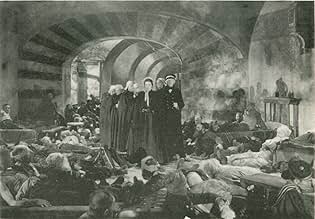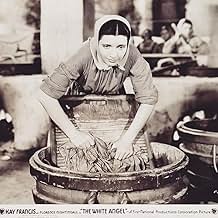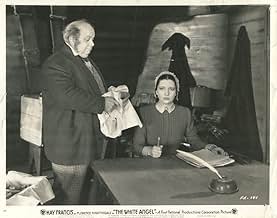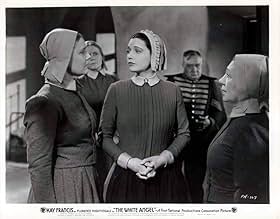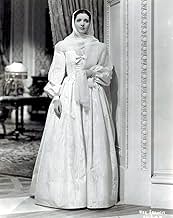IMDb RATING
6.6/10
443
YOUR RATING
A look at the life of Florence Nightingale.A look at the life of Florence Nightingale.A look at the life of Florence Nightingale.
- Awards
- 2 wins & 1 nomination total
Lillian Kemble-Cooper
- Parthenope 'Parthe' Nightingale
- (as Lillian Cooper)
Featured reviews
In the grand tradition of biography pictures that sanctify their subjects comes "The White Angel," the "true" story of the lady with the lamp, the nurse who revolutionized nursing, Miss Florence Nightingale. Why does Hollywood insist on sanitizing and sweetening the lives of real people? The most blatant example of this is probably "Private Parts"- the life story of Howard Stern- which turns America's favorite sexually-stunted shock-jock bully into a misunderstood merry prankster, a teddy bear of a man fighting the good fight against prudes and censors. Right.
I caught "The White Angel" on TCM late one evening. It begins with Florence Nightingale- "Flo" to her contemporaries- rejecting tradition and refusing to marry and settle down. She senses a greater purpose and a place for women in military medicine. [In actuality Florence and her sister were encouraged to pursue education by their forward-thinking father.] As played by Kay Francis, Ms. Nightingale is a humorless, passionless saint with absolute confidence in her methods and philosophy. Kay plays the role as if she's riding a heroin high- deeply centered and somewhat removed. With the success of the film riding on this lead performance, we're left with a fascinatingly anti-climactic picture.
There is little if any dramatic conflict in the film- it has all the suspense of a book report. The encounters between Florence and other characters are all laughably wooden. Her antagonists openly profess their resentment of her to her face and she sits stoic, with eyes-wide, accepting the abuse and calmly declaring her intentions to proceed. In one particularly action-less sequence, Florence and her nurses storm the supply tent after the clerk tells them it's closed. "Does the war close at seven?" Florence asks, "Do they stop bringing in the wounded at seven?"
Before the bureaucrat gets the chance to answer, Florence has delicately and glamorously stepped past him, forcing her way inside with the help of the other nurses.
That's the most exciting moment in the movie.
Henry Wadsworth Longfellow stops by to gawk at her heroism and write the poem that would immortalize her. Crusty wounded soldiers smile at her tenderness as she walks the hospital halls at night checking on her patients. I had trouble keeping mine.
The story seems SO glossed-over and tidy (even for a biopic of the 30's) that one can't help but feel cheated by fabricated elements as well as the absence of significant actual events. When Florence arrives at the military hospital a soldier informs her that 57% of all wounded men die even under medical care... the trouble is we're never given an updated number as to a soldier's chance of survival. This is especially ironic due to the fact that a)Florence's Nightingale's arrival and improvement of the military medical system surely improved the survival rate and b) Nightingale herself was famous for her statistical analysis and record-keeping of mortality rates and other social phenomenas. Disappointing.
The film is ultimately a waste; it is predictable and pre-digested, not even diverting enough to hold my attention. Who knew changing the world could be so boring?
Grade: C
I caught "The White Angel" on TCM late one evening. It begins with Florence Nightingale- "Flo" to her contemporaries- rejecting tradition and refusing to marry and settle down. She senses a greater purpose and a place for women in military medicine. [In actuality Florence and her sister were encouraged to pursue education by their forward-thinking father.] As played by Kay Francis, Ms. Nightingale is a humorless, passionless saint with absolute confidence in her methods and philosophy. Kay plays the role as if she's riding a heroin high- deeply centered and somewhat removed. With the success of the film riding on this lead performance, we're left with a fascinatingly anti-climactic picture.
There is little if any dramatic conflict in the film- it has all the suspense of a book report. The encounters between Florence and other characters are all laughably wooden. Her antagonists openly profess their resentment of her to her face and she sits stoic, with eyes-wide, accepting the abuse and calmly declaring her intentions to proceed. In one particularly action-less sequence, Florence and her nurses storm the supply tent after the clerk tells them it's closed. "Does the war close at seven?" Florence asks, "Do they stop bringing in the wounded at seven?"
Before the bureaucrat gets the chance to answer, Florence has delicately and glamorously stepped past him, forcing her way inside with the help of the other nurses.
That's the most exciting moment in the movie.
Henry Wadsworth Longfellow stops by to gawk at her heroism and write the poem that would immortalize her. Crusty wounded soldiers smile at her tenderness as she walks the hospital halls at night checking on her patients. I had trouble keeping mine.
The story seems SO glossed-over and tidy (even for a biopic of the 30's) that one can't help but feel cheated by fabricated elements as well as the absence of significant actual events. When Florence arrives at the military hospital a soldier informs her that 57% of all wounded men die even under medical care... the trouble is we're never given an updated number as to a soldier's chance of survival. This is especially ironic due to the fact that a)Florence's Nightingale's arrival and improvement of the military medical system surely improved the survival rate and b) Nightingale herself was famous for her statistical analysis and record-keeping of mortality rates and other social phenomenas. Disappointing.
The film is ultimately a waste; it is predictable and pre-digested, not even diverting enough to hold my attention. Who knew changing the world could be so boring?
Grade: C
With a title like The White Angel, you kind of know what you're going to get, if you'll excuse the pun, a whitewash. Of course a person like Florence Nightingale should be celebrated for her achievements but this film presents her as a saint rather than a living, breathing and flawed human being. Again, no joke intended but the characters for her are depicted as heroic and those against her, villainous, so, rather black and white. A more serious biopic might have been entitled The Lady With the Lamp and indeed a passage of the film where various characters read out Longfellow's poem of the same name is one of the most effective and moving scenes of the film. German director, William Dieterle, known for many great movies such as the beloved 1939 version of The Hunchback of Notre Dame and more significantly, for me, 1941's masterpiece, The Devil and Daniel Webster, is a sure hand on the tiller and moves things along with pace and interest but is fighting a battle with the script. The best you can say of it, is it is of it's time. The worst affected is the star, Kay Francis, a fine actress who delivers with conviction but is encumbered with po faced and twee lines that beggar belief. Her talent is evident in that she still manages to make her role engaging. Fortunately, she also has a sterling cast to play alongside her; on the 'good' side the redoutable Halliwell Hobbes brings charisma in spades as Lord Raglan and Ferdinand Munier is enjoyably whimsical as the camp cook, Soyer. On the distaff side, Donald Crisp is effectively cold as Dr Hunt, Montagu Love, suitably oily as Bullock and Nigel Bruce, my reason for watching, is hugely pleasurable to watch as the pompous and condescending Dr West, and unlike the other two antagonists, manages to be likeable into the bargain. All three represent the crushing patriarchy that our heroine needs to overcome both in England and the Crimea. Striking a false note is Billy Mauch as drummer boy, Billy, so very American and so very twee that his appearances jar and take you out of the story. Talking of twee, the appearance of Queen Victoria's arm and her arm only, takes the biscuit! But to conclude at an hour and a half with first rate acting and direction this is a good biopic and with a stronger script could have been a excellent one.
The sharp, focused performance by Kay Francis carries this film into an impressive arena for its viewer. I've seen in several times and although Francis doesn't go into histrionics in her portrayal like some of the "greats" would -- Francis exemplifies the determination, courage, and humaness of one who "feels a calling". She never wavers in what she is about, frustrated but not discouraged, and Francis' subtlety emphasises these qualities. The beginning of the film offers Francis a chance to don the elegant gowns of the mid 1800's, but most of the film she's wearing a plain nurse's uniform and often looking quite drawn from the conflicts with male prejudice on the Crimean front and the squalid conditions that she faced in all directions. I don't know how historically accurate the film is, but it gets to the heart of the Nightingale story and what she was up against. Strong support from players like Donald Crisp and Ian Hunter add to the overall success.
It's very melodramatic, reminding me of Young Tom Edison. Every "tidbit" the average person knows about the famous person is included in the script, in the most saccharine-style possible. Months after she sits up all night with Billy Mauch when he's ill, he finds her sitting in the snow. "I'm taking care of you now," he says as he gives her his coat. There are countless scenes like that one, as costars who play coworkers of Florence Nightingale praise her selflessness and dedication to her patients. In another scene, she comes down with cholera, and rather than letting the medical staff carry her away on a stretcher, the soldiers in the trench insist on doing it. That's fine, but one soldier actually says, "We'll do it! Who cares about cholera?" Way too corny for my taste.
But, if that's why you're watching the movie, you might not mind the style. I minded, because I was hoping for a more historical approach as to why she became a nurse, rather than just scene after scene of her forgoing sleep in order to sit up with a sick patient. There's a little portion of the beginning that shows her decline a marriage proposal in favor of medical school, but it's not very explanatory. There is a large supporting cast, though, including Henry O'Neill, Ian Hunter, Halliwell Hobbes, Nigel Bruce, Donald Crisp, Donald Woods, Fay Holden, and E. E. Clive. Watch at your own risk, and only if you like dated biopics.
But, if that's why you're watching the movie, you might not mind the style. I minded, because I was hoping for a more historical approach as to why she became a nurse, rather than just scene after scene of her forgoing sleep in order to sit up with a sick patient. There's a little portion of the beginning that shows her decline a marriage proposal in favor of medical school, but it's not very explanatory. There is a large supporting cast, though, including Henry O'Neill, Ian Hunter, Halliwell Hobbes, Nigel Bruce, Donald Crisp, Donald Woods, Fay Holden, and E. E. Clive. Watch at your own risk, and only if you like dated biopics.
Kay Francis stars in this biopic of Florence Nightingale. I love old Hollywood biopics. They get a lot of flack today by certain types for embellishing some facts of these people's lives. Seems to me biopics today have even worse flaws. Instead of embellishing positively they embellish negatively. In other words, instead of focusing on inspiring uplifting strengths and virtues they focus on the faults and vices of historical figures. To each their own but personally I will take the rousing biographical films from back then over the salacious and often slanderous ones of the modern era.
Rant aside, this is not the strongest biopic but it is a decent one. Kay Francis works against type quite well. She's helped by an amazing supporting cast. To name a few: Donald Crisp, Nigel Bruce, Donald Woods, Henry O'Neill, Ian Hunter, Halliwell Hobbes -- they all give first rate support.
Overall it's an entertaining film. I recommend it to people who are interested In the story of Florence Nightingale and anybody who enjoys Golden Age of Hollywood biographical dramas.
Rant aside, this is not the strongest biopic but it is a decent one. Kay Francis works against type quite well. She's helped by an amazing supporting cast. To name a few: Donald Crisp, Nigel Bruce, Donald Woods, Henry O'Neill, Ian Hunter, Halliwell Hobbes -- they all give first rate support.
Overall it's an entertaining film. I recommend it to people who are interested In the story of Florence Nightingale and anybody who enjoys Golden Age of Hollywood biographical dramas.
Did you know
- TriviaMuch disagreement to the origin of the source material exists. Some contemporary sources believed the source was Lytton Strachey's 1918 biographical essay in "Eminent Victorians". Others contend Michael Jacoby was the author. Warner Bros. executive Hal B. Wallis contended that the life of Florence Nightingale was in the public domain, and that screenwriter Mordaunt Shairp did his own research. The MPAA agreed with Wallis; no source credit was necessary.
- GoofsWhen Florence is receiving the news on the steps of the hospital of the sinking of the French transport, the shadow of the boom microphone moves onto then quickly off her left sleeve.
- Crazy creditsPrologue: Towards the year 1850, England was at peace with the world. Her men were following her ships to the four corners of the earth, building the great empire that is Queen Victoria's monument. Women were only permitted to nod meek approval. In all England, only Her Majesty had the right to express herself with the independence of a man.
- ConnectionsFeatured in Breakdowns of 1936 (1936)
- SoundtracksAuld Lang Syne
(uncredited)
Traditional
Lyrics by Robert Burns
Incorporated into the score at the new year
Sung by the crowd celebrating the new year
Details
- Release date
- Country of origin
- Language
- Also known as
- The White Angel
- Filming locations
- Production companies
- See more company credits at IMDbPro
- Runtime
- 1h 32m(92 min)
- Color
- Sound mix
- Aspect ratio
- 1.37 : 1
Contribute to this page
Suggest an edit or add missing content



